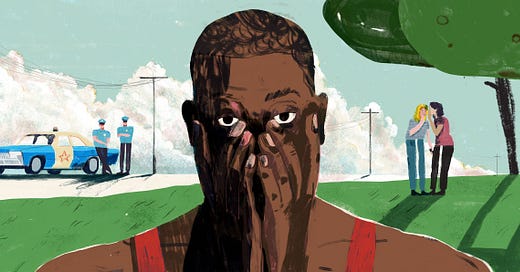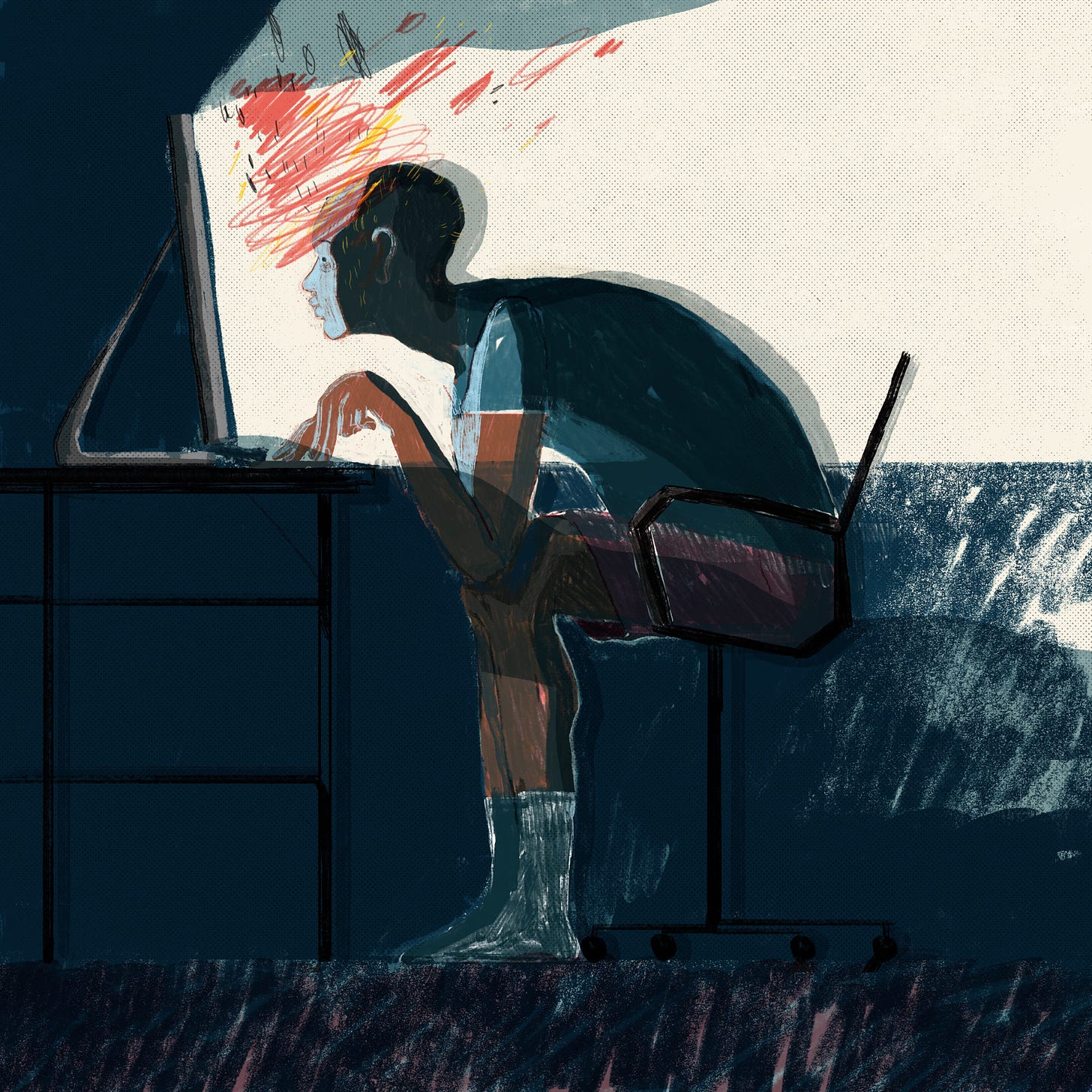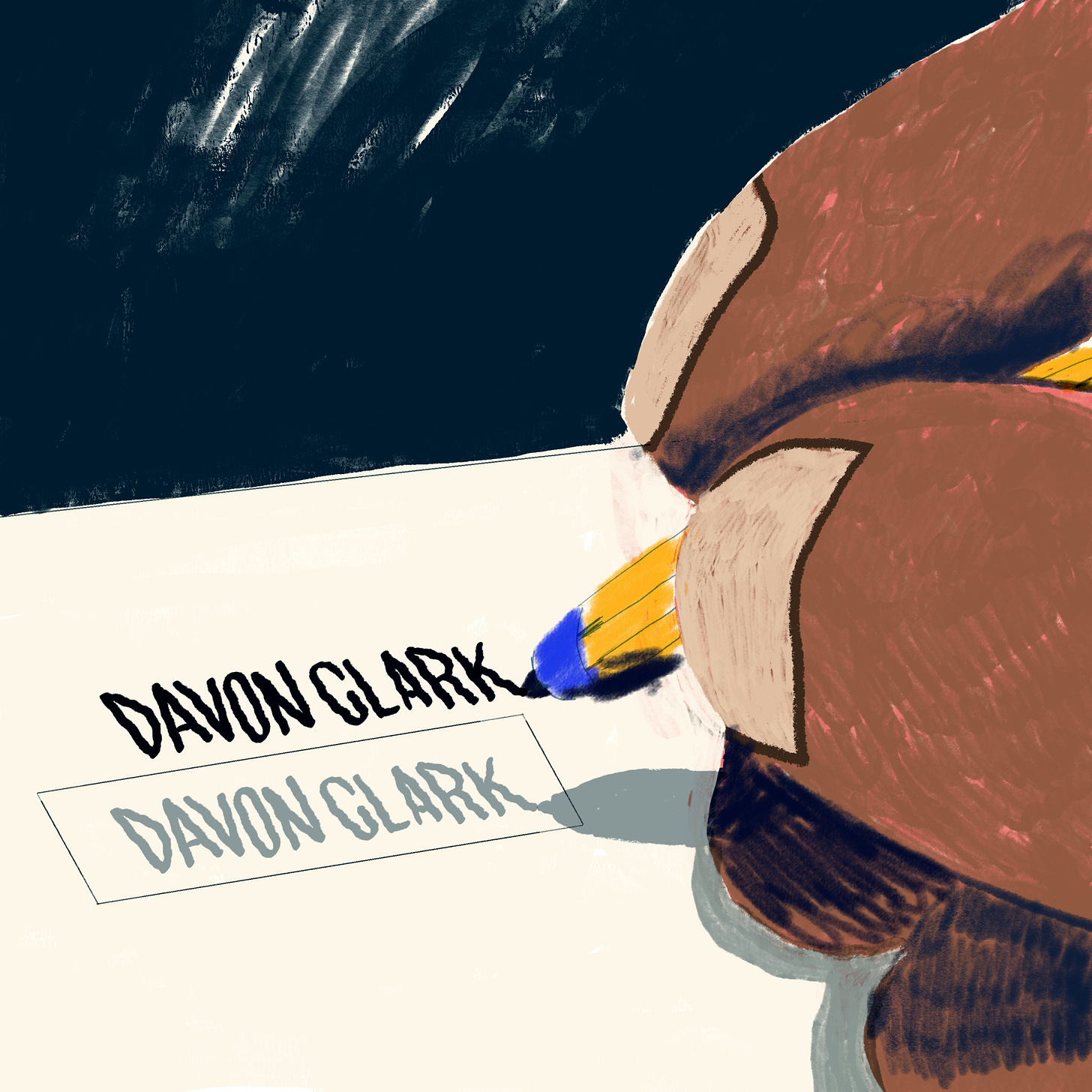My Name-Twin Was Arrested for Robbery...and Everyone Thought It Was Me
When I bumped into the other Davon Clark in college, it was funny. When friends confused our dating profiles, it was weird. When he got in trouble with the cops, my life started to fall apart.
I walked out of class and pulled my phone out of my pocket. There were dozens of missed calls and messages from my girlfriend. She was demanding to know why I was on Tinder. One of her friends was claiming that she had found me on the app, and she had sent a screenshot of the bio to my girlfriend. Sure enough, his first name and interests were identical to mine.
After collecting myself, I gave my girlfriend a call. She answered yelling, understandably. I gave her a few minutes and then tried to explain: It was someone else. She shot back that she knew I was lying. Her friend had started a conversation with the guy and he’d told her his full name, Davon Clark — which was also my name.
I knew exactly who it was: The other Davon Clark, the one who also happened to be a 20-something black boy, attending the same university, and like me, wrestling and writing poetry. I had first learned about this uncannily similar Davon a year ago, and now he was showing up on Tinder, causing this uncomfortable conversation between my girlfriend and me. (To be fair to her, something like this had happened before: A year earlier, a friend of hers had sent her a screenshot of my actual profile. I had made it after a bad argument. Although I wasn’t on Tinder anymore at this point, from her point of view, it wasn’t outside the realm of possibility.)
On the phone, I started laughing. I asked for a picture of the other Davon, and her friend sent another screenshot from the Tinder profile. Clearly not me. My girlfriend said she understood, and the matter was put to rest. But little did I know, things were about to get way more uncomfortable.
I had wanted to meet another Davon since childhood. Being the only kid with my name in school made me feel like I stood out too much. I finally did meet my first Davon in high school, when a freshman with the same first name joined the lacrosse team. Finding that first Davon was validating. And when I found another Davon Clark in college, it was unexpectedly comforting — at least initially.
I first learned about him during my junior year of college. A friend on another university’s club wrestling team texted that he was excited to see me wrestle that weekend at a tournament a couple of hours away. I told him that I was back on campus with a knee injury and hadn’t made the trip. He replied with a picture of the bracket. Sure enough, a Davon Clark from Penn State in the 165-pound weight class was signed up, weighed in and ready to go. I called my teammates to find out who was pulling this prank — it was club sports, we were always pranking each other — but instead I found out that there was another Davon Clark at one of Penn State’s commonwealth campuses who happened to wrestle in the same class. We connected over the phone and laughed about it, and the tournament went on according to plan. Davon and I added each other on social media, and I forgot all about it.
But when the other Davon Clark transferred to my campus and matched with my girlfriend’s friend on Tinder, it started to feel surreal. Suddenly, I was walking around the same buildings, quads and classrooms as the other Davon Clark. Then one night while I was working the door at a nightclub, I was scanning IDs and my name popped up. I looked past the screen, we made eye contact, and this was the moment — finally we met in person. We dapped up, made plans to link up after finals, and parted ways for the evening.
A few weeks later, I woke up to a slew of texts from people in town asking if I was OK. They’d seen my name in the paper regarding a police run-in. I figured it was another name mix-up, so I Googled “Davon Clark Penn State” and found a few articles. I learned that the other Davon Clark was facing multiple charges after a wild night in which he allegedly ripped off a tablet from an Uber driver, stole items from a car, and threatened and scuffled with a friend’s former roommates.
It wasn’t the first time an acquaintance of mine had had legal troubles, and it damn sure wasn’t the first time I’d been mistakenly accused of being involved, but my anxiety was still surging. Nothing had been more ingrained in me as a black man than the mandate to do whatever I had to in order to avoid being seen as a problem to society. Now it felt like I had failed that simply by having the wrong name. It felt like the plot of a sitcom and a nightmare rolled into one.
More phone calls, emails and texts about the other Davon’s mishaps poured in until the end of the semester a month later. If close friends, family, colleagues and peers confused us, what would keep the rest of the world from doing so? It felt like an episode of Black Mirror — I had crossed paths with someone just like me. He soon became a reality I couldn’t escape. Potential bosses, dates and roommates have all believed I’m the other Davon Clark.
A supervisor for a one-off advertising gig I took shortly after the other Davon Clark’s arrest looked me up before hiring me. After finding articles about the other Davon Clark’s run-ins, he still gave me a phone interview. At the end of it, he asked me if the charges were anything to worry about. I might have taken his question less seriously — something we would laugh about in the future — if he didn’t ask me if I was sure I wasn’t the other Davon. It was disheartening. Did it actually matter that I was a different person than the guy that got arrested, if people didn’t believe me?
Fearing that it might cost me progress toward my goals, I decided to take action and separate myself from any possible confusion. I overextended myself, taking on too many opportunities that came my way, to prove that I had navigated past what American society expects of a millennial black boy. I had never wanted the kind of job that would require a LinkedIn account, but I started one to shut up future employers. I made sure that my name was the same on all of my social media accounts, and I loaded up my online presence with résumés, pictures and accolades. I pitched freelance assignments in hopes of pushing articles about the other Davon’s encounter with the police down a few pages on Google. Suddenly, instead of putting an emphasis on excelling at what I did, all of my work became dedicated to proving that I was worthy of fair treatment. It was exhausting — I was running myself into the ground trying to outrun my own name.
In my attempt to individualize myself, I soon realized how I had been fueled by fear — even before the incident with the other Davon Clark. Like most other black youth, I’d been profiled and stereotyped my whole life, even though we also grew up with the idea that leading an exceptional life could separate us from society’s assumptions. If not for the fear of being dismissed as undeserving and incapable, I wasn’t totally sure that I would have wrestled, gone to college, pursued journalism and pushed myself to the point where I was. Now that a simple Google search aligned me with an alternate reality where I found myself on the wrong side of American law, it made me question my role as an advocate for my own community. Throughout college, I’d been an activist on issues like the high incarceration rates of black people, but now I was afraid to be seen as someone with a criminal record. I asked myself: Was my kinship coming from a genuine place?
I was glad I’d taken all of those steps to become the person I was now, but suddenly I wasn’t sure if it was all worth it, because I kept finding myself confronting stereotypes about millennial black men. I thought I had lived my life “the right way,” but I was angry to still be running into other people’s judgments of me — and now I was fielding judgments about someone else too. Proving that you are not what you fear yourself most to be can too easily slip into putting others down to pull yourself up.
A few months later, something happened that made me put myself in Davon’s shoes. One day, two cop cars pulled up next to me. They were responding to a public disturbance call about an argument I was having with another student. Nothing came of the encounter, but the experience froze me. I thought about being arrested on campus and having my mug shot in the newspaper the next day. I couldn’t stop thinking about getting the same calls and emails and having to tell everyone, “Yes, actually, that is me — I’m that Davon Clark.”
It made me feel for the other Davon. I believe he had a stress-filled evening and lashed out in an attempt to take control. He was a transfer student still adjusting to campus. His living situation was in limbo, the semester was coming to a close, and finals were approaching. What’s more, the political climate was extremely hostile, with an uptick in racist incidents post-election in the dead center of a swing state. The other Davon’s mug shot was plastered across the internet, but I knew of other harmful incidents on campus in which students — myself included — had gotten off with their anonymity intact. The more that people assumed the worst of me from these Google searches, the more unfair it felt to have had the privilege of keeping my mistakes hidden, while someone just like me in so many ways wasn’t so fortunate.
I’ve done many more internet searches on my name since the last time someone asked me about the charges. And I’ve been surprised to find a lot more Davon Clarks. I found another central Pennsylvania–based Davon Clark. This one had been booked on cocaine possession charges earlier that same spring in a county outside of my college town. I also found an award-winning children’s book author named Davon Clark, which might make it a bit harder to establish my own identity as an author in the future. I found a vlogger, a poet, a podcaster, athletes and so many others with my name.
After long nights of trying to separate myself from the other Davon Clark, I’ve started to find solace in how little other people’s perception of me based on my name matters. The people who need to know me will know me. The people who don’t need to know me won’t find out more than what they see on the surface. And the people who want to know me will ask.
The Davon Clark that wrote “My Name-Twin Was Arrested for Robbery…and Everyone Thought It Was Me” is a photojournalist and poet who grew up in Philadelphia and is currently based in Chicago. His work looks to investigate the gaps in media coverage on the communities he lives in and is peripheral to.
Thomas White is a freelance illustrator based in North West England. He is originally from Brighton but now splits his time between Liverpool and London and creates work for a number of international clients. He has exhibited his work nationwide at galleries including The Old Truman Brewery, Red Gallery Shoreditch and Farley's Yard in East Sussex.
Naomi Zeveloff is an American reporter, editor and writing coach based in Jaffa. The former Middle East correspondent of The Forward, she has written for The Atlantic, Foreign Policy, CityLab, and many other outlets.









